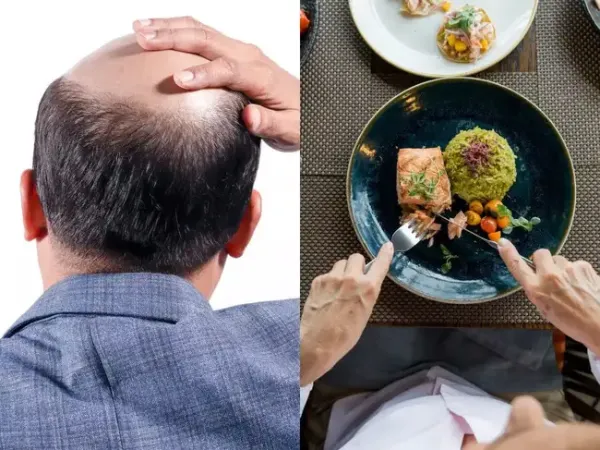Hair fall has become one of the most widespread health concerns today, cutting across age groups and lifestyles. While many people quickly assume that thinning hair is the result of genetics or unavoidable ageing, specialists say the picture is far more complex. Increasing evidence shows that everyday diet choices, digestive health, and nutrient absorption may play a bigger role in hair loss than most people realise. This shift in understanding is prompting experts to look beyond hereditary factors and focus on what the body is — or isn’t — getting from food.
Gut Health and Hair: The Hidden Connection
Hair growth depends on a steady supply of protein, vitamins, minerals, and healthy fats. These nutrients fuel cell division, keratin production, and follicle activity. But the digestive system is what breaks food down and transports these nutrients to the scalp. When digestion is disrupted, the follicles may not receive enough raw materials to maintain strong growth.
Doctors explain that conditions such as Irritable Bowel Syndrome (IBS), Inflammatory Bowel Disease (IBD), malabsorption disorders, or imbalances in gut bacteria can make it difficult for the body to absorb essential nutrients. This often leads to deficiencies in amino acids, B vitamins, iron, and zinc — all of which are critical for hair structure and growth.
Why Gut Flora Matters for Hair Strength
A healthy gut contains hundreds of bacterial species that support digestion and nutrient absorption. These microbes help process complex foods and create important compounds like B vitamins (B1, B2, B5, B7, B9), vitamin K, amino acids, and triglycerides. These nutrients support keratin formation and cell metabolism, both of which are necessary for hair growth.
A study published in Postepy Dermatol Alergol noted that people with alopecia areata often have less diverse gut bacteria. Researchers observed that this imbalance may affect nutrient absorption in a way that weakens hair follicles. Some studies even suggest that restoring gut microbiome balance through diet or probiotics may help stimulate regrowth in certain individuals.
IBS affects over 7% of people globally and is known for symptoms like bloating, diarrhoea, and constipation. These digestive issues limit the body’s ability to properly absorb nutrients. Many IBS patients report thinning hair and increased brittleness.
In IBD — which includes Crohn’s disease and ulcerative colitis — chronic inflammation and malabsorption frequently lead to mineral and vitamin deficiencies. Research published in Inflammatory Bowel Diseases highlights that hair loss in IBD patients is commonly linked to shortages of iron and zinc, ongoing inflammation, and even shared genetic factors with alopecia areata. Medications used to treat IBD may also contribute to shedding.
Diet Changes That Can Improve Hair Growth
Experts emphasise that improving diet quality is one of the most effective ways to support both gut function and hair growth. A nutrient-rich plate ensures that the body has the raw materials it needs for strong, healthy hair. Protein is essential because it forms the structural base of each strand, and it can be obtained from eggs, meat, fish, dairy, soy, legumes, and whole grains. Omega-3 fatty acids, found in fatty fish, nuts, seeds, and plant oils, help maintain cell membranes and support hormonal balance, both of which influence hair health.
Vitamin B12 plays an important role in cell replication and overall growth, and is primarily sourced from meat, fish, eggs, and dairy, with vegans often requiring supplements. Iron is another key nutrient, as low levels are closely linked to hair thinning; red meat, liver, beans, nuts, cereals, and dried fruits are common sources.
Zinc supports immune function and hair follicle activity and can be obtained from seafood, meat, legumes, and seeds. Glutathione, whether consumed through diet or supplements, helps counter oxidative stress that can weaken follicles. Beyond these nutrients, habits such as staying hydrated, managing stress, and including probiotics or fermented foods can strengthen gut flora, ultimately contributing to improved hair density and scalp health.
Gut Health and Hair: The Hidden Connection
Hair growth depends on a steady supply of protein, vitamins, minerals, and healthy fats. These nutrients fuel cell division, keratin production, and follicle activity. But the digestive system is what breaks food down and transports these nutrients to the scalp. When digestion is disrupted, the follicles may not receive enough raw materials to maintain strong growth.Doctors explain that conditions such as Irritable Bowel Syndrome (IBS), Inflammatory Bowel Disease (IBD), malabsorption disorders, or imbalances in gut bacteria can make it difficult for the body to absorb essential nutrients. This often leads to deficiencies in amino acids, B vitamins, iron, and zinc — all of which are critical for hair structure and growth.
Why Gut Flora Matters for Hair Strength
A healthy gut contains hundreds of bacterial species that support digestion and nutrient absorption. These microbes help process complex foods and create important compounds like B vitamins (B1, B2, B5, B7, B9), vitamin K, amino acids, and triglycerides. These nutrients support keratin formation and cell metabolism, both of which are necessary for hair growth.A study published in Postepy Dermatol Alergol noted that people with alopecia areata often have less diverse gut bacteria. Researchers observed that this imbalance may affect nutrient absorption in a way that weakens hair follicles. Some studies even suggest that restoring gut microbiome balance through diet or probiotics may help stimulate regrowth in certain individuals.
IBS affects over 7% of people globally and is known for symptoms like bloating, diarrhoea, and constipation. These digestive issues limit the body’s ability to properly absorb nutrients. Many IBS patients report thinning hair and increased brittleness.
In IBD — which includes Crohn’s disease and ulcerative colitis — chronic inflammation and malabsorption frequently lead to mineral and vitamin deficiencies. Research published in Inflammatory Bowel Diseases highlights that hair loss in IBD patients is commonly linked to shortages of iron and zinc, ongoing inflammation, and even shared genetic factors with alopecia areata. Medications used to treat IBD may also contribute to shedding.
Diet Changes That Can Improve Hair Growth
Experts emphasise that improving diet quality is one of the most effective ways to support both gut function and hair growth. A nutrient-rich plate ensures that the body has the raw materials it needs for strong, healthy hair. Protein is essential because it forms the structural base of each strand, and it can be obtained from eggs, meat, fish, dairy, soy, legumes, and whole grains. Omega-3 fatty acids, found in fatty fish, nuts, seeds, and plant oils, help maintain cell membranes and support hormonal balance, both of which influence hair health. Vitamin B12 plays an important role in cell replication and overall growth, and is primarily sourced from meat, fish, eggs, and dairy, with vegans often requiring supplements. Iron is another key nutrient, as low levels are closely linked to hair thinning; red meat, liver, beans, nuts, cereals, and dried fruits are common sources.
Zinc supports immune function and hair follicle activity and can be obtained from seafood, meat, legumes, and seeds. Glutathione, whether consumed through diet or supplements, helps counter oxidative stress that can weaken follicles. Beyond these nutrients, habits such as staying hydrated, managing stress, and including probiotics or fermented foods can strengthen gut flora, ultimately contributing to improved hair density and scalp health.








